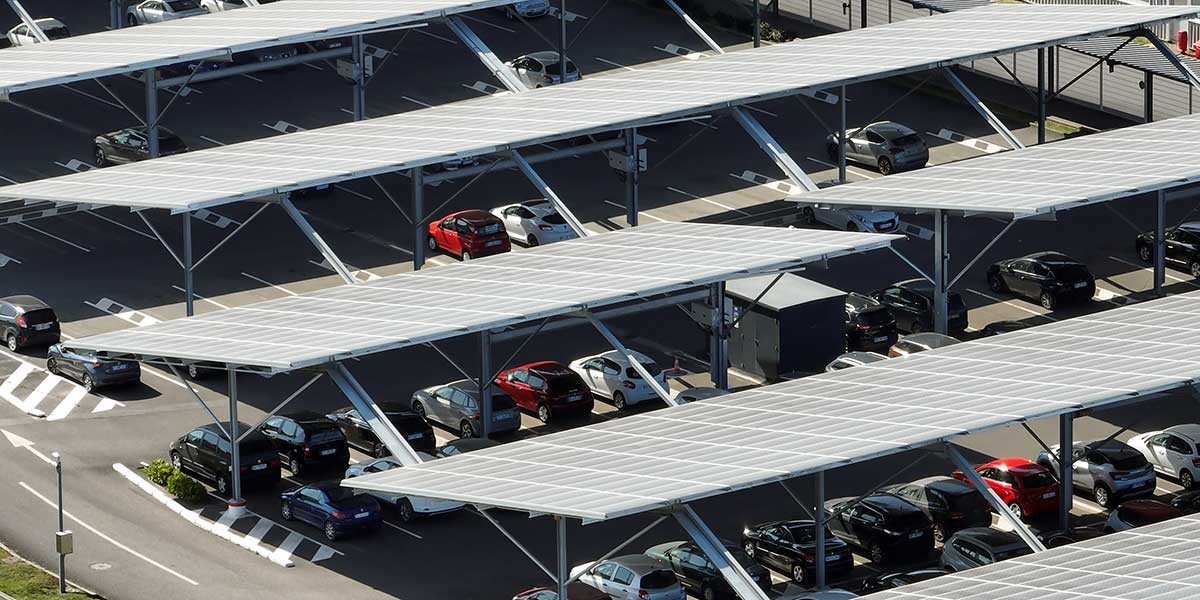The transportation industry, a major contributor to greenhouse gas emissions, stands at a pivotal point where innovative approaches can significantly reduce its environmental impact. Among these, solar panels have emerged as a game-changer, particularly when installed on the rooftops of bus and railway stations, and taxi ranks. HDM Energies’ ‘Energy for All’ scheme can integrate solar energy into these key transportation hubs at zero capex, revolutionising the sector and offsetting emissions.
Rooftop Solar Panels on Stations
Solar panels can be installed on the roofs of railway stations, bus stations, and stops to reduce dependence on the grid and lower operational costs. From as little as 15p per kWh* with HDM Energies, solar panels can generate electricity to power station facilities, lighting, and electric vehicle (EV) charging points. The clean energy can also be used to charge electric trains and buses, further reducing their carbon footprint. Solar-powered bus stops can even use the generated energy to illuminate promotional panels and information boards at night.
Solar-Powered Charging Points
Solar canopies and carports can also be integrated into taxi ranks, the design of new stations, or retrofitted to existing structures, enabling electric vehicles, including cars, buses, taxis, and private cars, to be charged with renewable energy. This system supports a shift away from fossil fuels towards a more sustainable energy model that can benefit both the public parking at the station and employees. This not only reduces emissions but also supports the growing demand for eco-friendly transportation options.
With our Energy for All scheme, we can add an EV charger to systems for free. By allowing the public parking at stations or using park and ride services access to EV charging points, all businesses do is pay a competitive rate for its use.
Shift to Cleaner Emissions
Incorporating solar energy into transportation offers numerous advantages. Solar-powered transit systems produce significantly lower greenhouse gas emissions compared to their fossil fuel counterparts. This can help offset the carbon emissions of buses and taxis, aiding in the fight against air pollution, particularly for transport networks operating in busy towns and cities.
Don’t Stall on Sustainability
Adopting solar energy demonstrates a strong commitment to environmental stewardship and helps transportation organisations meet their net-zero targets. It also appeals to eco-conscious travellers who prefer sustainable transportation options.
Cruise Into Cost Savings
With a PPA from HDM Energies, transport networks can benefit from solar at zero capex. With energy prices far below the grid average, from just 15p per kWh*, the long-term savings on energy bills and reduced overheads can be substantial.
Turbocharging Efficiency
Solar panels provide a reliable and consistent source of energy, reducing dependency on non-renewable resources and enhancing energy security for stations and transportation hubs. Solar energy systems can provide a more robust and resilient energy source, particularly in the face of power outages or disruptions in the traditional power grid that could affect public transportation.
Overcoming Challenges With ‘Energy for All’
One of the primary challenges in adopting solar technology is the high initial cost. With our ‘Energy for All’ scheme, transportation systems can mitigate these expenses. We make solar energy more accessible, offering solar panel installations with no capital expenditure, and providing energy at a fixed, competitive rate starting from just 15p per kWh*. With contract lengths ranging from 5 to 25 years, transportation networks can enjoy stable, predictable energy costs while offsetting their carbon emissions for years to come.
Driving into a Solar-Powered Future
The integration of solar panels on the rooftops of bus and railway stations, and taxi hubs, is a vital step towards a greener, more sustainable transportation system. Solar power generation can help to reduce energy consumption from non-renewable sources, promoting a cleaner and more efficient transit system. With HDM Energies, transport networks can offset their carbon emissions, lower operational costs, and support the global transition towards a greener future.






